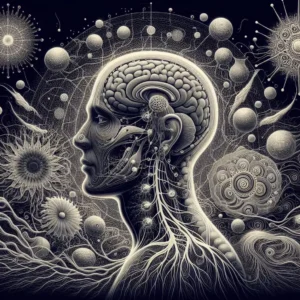Kapha dosha is one of the three fundamental doshas in Ayurveda, representing the earth and water elements. Understanding Kapha dosha characteristics is crucial for maintaining balance in the body and mind. Below are the key characteristics associated with Kapha dosha:
Characteristics of Kapha Dosha :

Table of Contents
1. Physical Characteristics of Kapha Dosha Dominant Person

Kapha dosha governs the physical structure and stability of the body. Individuals with a dominant Kapha constitution typically exhibit the following physical traits:
- Body Type: Kapha individuals often have a solid, well-built, and heavy body frame. They are naturally strong and tend to gain weight easily due to their slow metabolism.
- Skin: The skin of Kapha-dominant individuals is smooth, oily, and cool to the touch. It has a natural glow but is prone to excessive oiliness and congestion if not properly balanced.
- Hair: Thick, lustrous, and strong hair is a common trait of Kapha individuals. Their hair tends to be wavy or curly and is less prone to dryness.
- Eyes: Large, attractive, and calm-looking eyes are characteristic of Kapha. The whites of their eyes are usually bright and clear, and they often have thick, dark eyelashes.
- Voice: A deep, resonant, and pleasant voice is a hallmark of Kapha. Their speech is slow, deliberate, and often soothing to listen to.
2. Mental and Emotional Characteristics of Kapha Dosha Dominant Person

Kapha dosha also significantly influences mental and emotional qualities. The following traits are commonly observed in individuals with a dominant Kapha constitution:
- Personality: Kapha individuals are known for their calm, patient, and steady nature. They are often described as the “rocks” in their social circles, providing stability and support to those around them.
- Memory: They possess a strong, reliable memory, particularly when it comes to long-term information. While they may take time to learn new things, once they do, they retain the knowledge well.
- Emotion: Kapha-dominant people are naturally affectionate, loving, and forgiving. They form deep emotional connections and are often very loyal. However, they can become overly attached and resistant to change.
- Mind: The Kapha mind is slow to learn but thorough in its understanding. Kapha individuals may prefer to take their time in processing new information but tend to grasp concepts deeply once understood.
3. Behavioral Characteristics of Kapha Dosha Dominant Person

Kapha dosha influences behavior and lifestyle preferences, shaping how individuals interact with their environment and manage their daily routines:
- Energy Levels: Kapha individuals have consistently high energy levels but are slow to get started. They tend to conserve their energy and may appear lethargic when not properly motivated.
- Sleep: Deep and restful sleep is a characteristic of Kapha. They often need longer hours of sleep to feel fully refreshed and energized for the day.
- Appetite: Kapha individuals usually have a regular but not strong appetite. They prefer sweet, salty, and heavy foods, which can lead to imbalances if consumed in excess.
- Activity: Kapha-dominant people thrive on routine and often resist change. They may become sluggish and inactive when out of balance, making it essential for them to engage in regular physical activity.
Imbalances in Kapha Dosha
When Kapha dosha Characteristics becomes imbalanced, it can lead to various physical, mental, and emotional issues. Understanding these imbalances is key to addressing them effectively:
- Physical Imbalance: Signs of physical imbalance in Kapha include weight gain, water retention, congestion, and excessive sleep. The body may feel heavy and lethargic, with a tendency toward mucus-related issues such as sinusitis and respiratory infections.
- Mental Imbalance: Mentally, an imbalanced Kapha can manifest as lethargy, depression, stubbornness, and excessive attachment. Individuals may feel overly possessive or resistant to change, leading to a lack of motivation.
- Common Health Issues: Kapha imbalances are often linked to conditions such as obesity, diabetes, asthma, and respiratory problems. These issues arise from the accumulation of excessive earth and water elements, leading to stagnation in the body.
Balancing Kapha Dosha



Maintaining a balance in Kapha dosha along with Vata Dosha and Pitta Dosha is essential for overall well-being. Here are some key strategies to keep Kapha in check:
- Diet: To balance Kapha, favor warm, light, and spicy foods that stimulate digestion and reduce heaviness. Incorporate bitter, pungent, and astringent tastes into the diet while avoiding heavy, oily, and cold foods that can aggravate Kapha. Eating in moderation and avoiding overeating is also crucial.
- Lifestyle: Regular physical activity is vital for Kapha individuals to prevent sluggishness and stagnation. Incorporate dynamic exercises like running, swimming, or aerobics into the routine. Yoga, particularly poses that promote movement and flexibility, can also help balance Kapha. Avoid excessive sleep and maintain a consistent daily routine to stay energized and focused.
- Environment: Kapha individuals benefit from staying in warm and dry climates, as these conditions help counterbalance Kapha’s cool and damp nature. Avoiding cold, damp environments, particularly during the winter and spring seasons, is essential to maintain balance.
Understanding these Kapha dosha characteristics helps in maintaining harmony within the body and mind. By recognizing the signs of imbalance, one can take proactive steps to restore equilibrium and promote overall well-being.

Pingback: সকালে উঠে গ্যাস, বমি বা পেট ফাঁপা? আপনার রোজকার রুটিনেই রয়েছে বিপদ - Dr. Manash Mandal